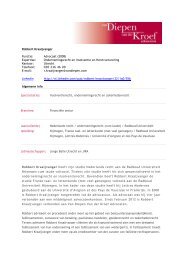© Van Diepen Van der Kroef Advocaten
© Van Diepen Van der Kroef Advocaten
© Van Diepen Van der Kroef Advocaten
- No tags were found...
You also want an ePaper? Increase the reach of your titles
YUMPU automatically turns print PDFs into web optimized ePapers that Google loves.
‘to hold the United Nations and the State of the Netherlands jointly and severally liable topay Plaintiff un<strong>der</strong> 1 through 10 an advance of EUR 25,000 per person of the compensationto be awarded, as claimed un<strong>der</strong> point 4 of the petition;’13. Contrary to what the District Court thought, it was not an advance of EUR 10,000 on thecompensation claimed but rather an advance of EUR 25,000. Even though the determinationby the District Court is not a determinative factor in the grounds for or the decision onjurisdiction, the Association et al. self-evidently has an interest in not being bound by thisincorrect determination by the District Court.Ground of appeal 214. The District Court has incorrectly summarised the defence of the Association et al. un<strong>der</strong>legal consi<strong>der</strong>ation 3.4 as follows:‘(1) Only the UN itself can, if it appeared, invoke its possible immunity. Since itdeliberately failed to appear, an assessment of the defence of lack of jurisdiction is out ofor<strong>der</strong>. The motions by the State are devious tricks, now that the State is expected to arguein the main proceedings that not the State but the UN is responsible for the eventsreferred to in the main proceedings. Legally, humanly and morally this is unacceptable.’Continuing on from this rendition the District Court incorrectly held un<strong>der</strong> legalconsi<strong>der</strong>ation 5.6 that:‘The State’s own interest in its interim motion follows particularly from its obligationun<strong>der</strong> international law by virtue of article 105 paragraph 1 of the UN Charter. Un<strong>der</strong> thistreaty the State has bound itself to safeguard as much as possible the immunity laid downin the Charter, irrespective of how far it extends. Pleading this immunity in proceedingsbefore a national court of law at least falls within the bounds of possibility. It is notimportant in this regard that the State itself is also a defendant, in this case alongside theUN. Now that the State is a party to the proceedings in its own right, it does not need tofollow the – in principle much more cumbersome – course of an interim motion of thirdpartyintervention. Neither does the possibility of which the State now makes use prejudicethe fact that in our system of law there are also other options for (organs of) the State toobtain a Court’s ruling on its jurisdiction regarding a non-appearing defendant. All these<strong>©</strong> <strong>Van</strong> <strong>Diepen</strong> <strong>Van</strong> <strong>der</strong> <strong>Kroef</strong> <strong>Advocaten</strong> page 7 of 99
















